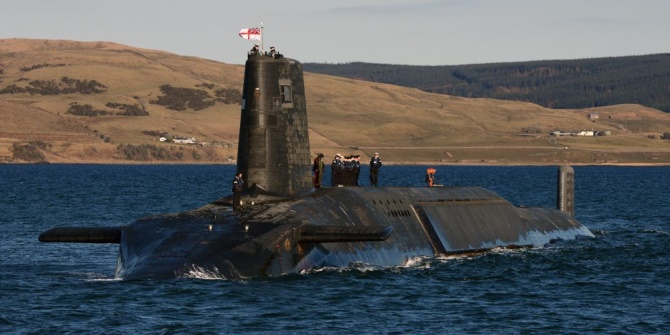 This morning sees the start of the G8 Summit, hosted by David Cameron and taking place at a golf resort in Northern Ireland. Chris Brown argues that the government will not get what it desires out of the meetings. Agreements on trade, tax and transparency are unlikely and, though the ongoing Syrian conflict will figure prominently in informal discussions, he believes Obama does not intend to intervene beyond sending small arms shipments to the rebels. On the bright side, the very fact that the meeting could take place in Northern Ireland says something very important and encouraging about the changes that have taken place there.
This morning sees the start of the G8 Summit, hosted by David Cameron and taking place at a golf resort in Northern Ireland. Chris Brown argues that the government will not get what it desires out of the meetings. Agreements on trade, tax and transparency are unlikely and, though the ongoing Syrian conflict will figure prominently in informal discussions, he believes Obama does not intend to intervene beyond sending small arms shipments to the rebels. On the bright side, the very fact that the meeting could take place in Northern Ireland says something very important and encouraging about the changes that have taken place there.
The G8 is a group of the leading developed economies – Canada, France, Germany, Italy, Japan, the USA, the UK and, since 1997, Russia. In addition the EU is represented at G8 meetings by the Presidents of the European Council and the European Commission. The G8 has no formal bureaucracy, and its members (other than the EU representatives) take turns in acting as President – the UK has held the Presidency since Jan 1st and will host the annual meeting of G8 leaders to be held on 17 – 18 June at the Lough Erne Hotel near Enniskillen in Northern Ireland.
G8 meetings are only rarely exciting occasions; usually the demonstrations that invariably accompany them are the most interesting story they produce. However, the last Summit hosted by the UK in July 2005 was the exception to this rule; it began with then prime minister and host Tony Blair arriving late on the back of his triumph in gaining the 2012 Olympics for London, continued with Bono and Bob Geldof ‘Making Poverty History’ and ended with Blair leaving early to preside over the aftermath of the 7/7 bombings. David Cameron will be hoping for rather less excitement this time; certainly there will be less pointless celebrity politics.
The G8 Presidency gives the host government the opportunity to press issues that it thinks important, both at the Summit itself and at the meetings that precede and follow it, meetings such as the ‘Nutrition for Growth’ Conference that took place in London on Saturday 8th June. For the actual Summit, the UK government has declared three issues to be crucial: advancing trade, ensuring tax compliance and promoting greater corporate transparency. Each is likely to be problematic and may backfire on the government.
On trade, the UK government is keen to advance the idea of an US-EU trade pact, and this is, indeed, something that has quite a lot of traction. Germany is certainly on board, but, as so often on these occasions, the French government may well slow things down. The exception culturelle that France has promoted since the GATT Talks of 1993 is once again in the news. It is designed to protect French ‘cultural goods’ from American competition. Left to their own devices, French movie-goers will go to Iron Man 3 rather than the latest Parisian art-house movie, and therefore, it is argued, the latter need special assistance to combat this unpatriotic behaviour. Given the importance these days of the infotainment industry, this is a serious matter. Add to this the current kerfuffle on internet privacy and the long-running European-US contest over the safety of GMOs (genetically modified organisms) and the prospects for serious progress on trade are not good.
On the other two ‘T’s, tax and transparency, more or less everyone agrees in principle on the importance of greater corporate openness and cracking down on tax avoidance, and everyone agrees that this can be done only by international cooperation. Unfortunately most countries have their own ways of attracting inward investment, many of which involve competitive tax breaks and the like, and if David Cameron pushes this one too hard someone is likely to point out that many of the most egregious tax havens are actually British overseas possessions. Indeed, some continental Europeans regard London as a kind of haven for irresponsible bankers. On transparency, the government intends to push for registers revealing the ultimate ownership of all corporations – not a popular move in the Cayman Islands or Jersey. In any case, it isn’t clear how such a register would be, or could be, policed.
These official aims may not be achieved, but in any event it seems likely that the real action of the summit will be off-stage, and focused on Syria, with a number of issues concerned with that crisis coming to a head. On the one hand, the US and Russian governments have been engaging in intense diplomacy to try to agree on strategies to ensure that the proposed UN/Arab League sponsored Conference on the crisis, now due to be held in Geneva in July, will actually take place. US Secretary of State John Kerry has recently returned from Moscow with the promise that discussions would continue in Northern Ireland, this time between the American and Russian Presidents. On the other hand, the British and French governments are pushing hard for more active steps to arm and support ‘reliable’ members of the Syrian opposition (assuming that such can be identified), and are attempting to pull President Obama away from dealing with Russia towards a more actively anti-Assad stance in the conflict. After all, American ‘redlines’ concerning chemical weapons appear to have been crossed, casualties on both sides continue to rise, the conflict is metastasizing into Lebanon and Iraq and, most worrying of all perhaps, the Assad regime is on the ascendant and thus unlikely to respond to indirect pressure. Surely the US must now throw its weight behind the Free Syrian Army and the ‘official’ opposition to Assad?
In spite of last Thursday’s announcement that the US will supply unspecified quantities of small arms to the official opposition, I believe that President Obama does not accept the wider argument. He has taken a long hard look at Syria and decided that, redlines or not, he isn’t going to allow the US to get involved. The situation is too complex, identifying the ‘good guys’ is too difficult and the support of Russia and Iran means that Assad will not be left friendless, the fate of Gaddafi a couple of years ago. The appointment of two prominent liberal interventionists to important positions within the US Administration – Samantha Power to the UN Ambassadorship and Susan Rice to the post of National Security Adviser – is seen by some to indicate a contrary stance, but, if they mean anything in this context, these appointments are designed to neutralise potential critics rather than to signal a genuine change of tack. There is the potential here for a serious rift between the US and its close British and French allies, but Obama’s cold realism will attract support from other members of the G8, and Britain and France are unlikely to push their arguments too far especially in view of Obama’s small shift in their direction with the arms decision.
Cameron in particular will be conscious that his own backbenchers are unenthusiastic about his activism over Syria. Everyone realises that an active intervention in Syria – ‘no-fly zones’ and the like – could only be successful if the US were to take the lead and if Obama doesn’t want to intervene there will be no intervention, end of story. The best hope for the Syrian people is that Obama and Putin will manage to thrash out a common position on the upcoming conference and put pressure on Assad and the opposition to attend. Sadly, even if such pressure succeeds and the conference takes place without walkouts, it is difficult to be optimistic about the prospects of a successful outcome. Most likely the conflict will continue until one side wins, although from the perspective of ordinary Syrians, ‘winning’ is likely to be indistinguishable from ‘losing’.
Final point; what of the effect of the Summit on Northern Ireland? This will be the biggest security exercise ever in Northern Ireland – which, when you consider the history of the last hundred years is in itself pretty extraordinary – but the very fact that the meeting could take place in the Province tells us something very important, and very encouraging, about the changes that have taken place there in the last decade. Let us hope that all goes well and that Enniskillen will become known for something other than murderous mayhem – a long feature story on the town in the New York Times on Tuesday 11 June could be an encouraging start. Apparently Lough Erne, Northern Ireland’s only 5 Star hotel and golf course, has been up for sale for two years. Perhaps one of the world leaders will decide that for $16 million it would make a classy holiday home?
Note: This article gives the views of the author, and not the position of the British Politics and Policy blog, nor of the London School of Economics. Please read our comments policy before posting.
Chris Brown is Professor of International Relations at the London School of Economics. He writes on international political theory, human rights, and issues of global justice. He is the author most recently of Practical Judgement in International Political Theory(2010) and of International Relations Theory: New Normative Approaches (1992),Understanding International Relations (1997; 4th edition, 2009), Sovereignty, Rights and Justice (2002), the editor of Political Restructuring in Europe: Ethical Perspectives (1994), and has published numerous journal articles. He is also the coeditor, with Terry Nardin and N. J. Rengger, ofInternational Relations in Political Thought: Texts from the Greeks to the First World War (2002).







